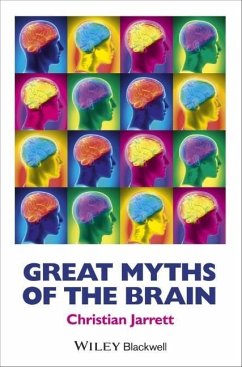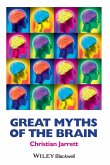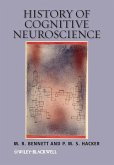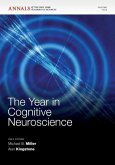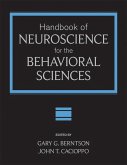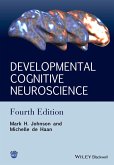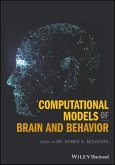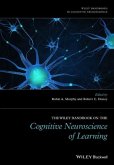Great Myths of the Brain introduces readers to the field of neuroscience by examining popular myths about the human brain.
Explores commonly-held myths of the brain through the lens of scientific research, backing up claims with studies and other evidence from the literature
Looks at enduring myths such as "Do we only use 10% of our brain?", "Pregnant women lose their mind", "Right-brained people are more creative" and many more.
Delves into myths relating to specific brain disorders, including epilepsy, autism, dementia, and others
Written engagingly and accessibly for students and lay readers alike, providing a unique introduction to the study of the brain
Teaches readers how to spot neuro hype and neuro-nonsense claims in the media
Hinweis: Dieser Artikel kann nur an eine deutsche Lieferadresse ausgeliefert werden.
Explores commonly-held myths of the brain through the lens of scientific research, backing up claims with studies and other evidence from the literature
Looks at enduring myths such as "Do we only use 10% of our brain?", "Pregnant women lose their mind", "Right-brained people are more creative" and many more.
Delves into myths relating to specific brain disorders, including epilepsy, autism, dementia, and others
Written engagingly and accessibly for students and lay readers alike, providing a unique introduction to the study of the brain
Teaches readers how to spot neuro hype and neuro-nonsense claims in the media
Hinweis: Dieser Artikel kann nur an eine deutsche Lieferadresse ausgeliefert werden.
"THESE days you can't go to a children's birthday party without one of the adults making a knowing comment about the excited scamps being "high on sugar". In fact, there's no evidence that sugar makes children hyperactive. But the remark illustrates the way false beliefs about how our brains work permeate most aspects of life - as does the burgeoning of buzzwords like neuromarketing or neuroleadership. Such "neurobollocks", to borrow the title of a popular science blog, is ably and entertainingly demolished by Christian Jarrett in Great Myths of the Brain. As a journalist in this field, I thought I would know most of these myths, but there was plenty here that was new and interesting to me." (New Scientist, December 2014)
"The book is also very impressive in its scope, covering things like the historical notion that the heart was actually the source of consciousness, to modern-day problems like how fMRI scans are believed to be far more powerful than they actually are. The writing is often very clear but without compromising accuracy or thoroughness, which is an impressive feat in its own right." (The Psychologist, Autumn 2014)
"Christian Jarrett's Great Myths Of The Brain is the sort of book that every amateur brain enthusiast should have on his or her shelf. The book is an effort to assemble all the common and not-so-common myths about the brain, past and present, and explain why they're all wrong using genuine neuroscience." (BBC Focus Magazine, January 2015)
"Great Myths of the Brain is a kind of primer that teaches neuroscience by debunking neurononsense, beginning with ancient ideas like "Thought Resides in the Heart." You'll learn that much of the neuroscience you hear is trivial or wrong, and also see the useful research threads to follow. The word "brain" isn't entirely giving us false hope. A neuroscientist-turned-writer, Christian Jarrett is editor of the British Psychological Society's Research Digest, a blogger, and the father of baby twins. His elegant, enthusiastic prose doesn't shy from controversy." (The Weekly Standard, April 2015)
"As you can tell from the length of this review, there is a lot to be learnt from this book. I certainly learnt a few things even if I wasn't always taken in by some of the myths out there. The brain is a remarkable organ and clearing away the myths to see what is really there will show its true strengths and if you use in your fiction, make for better up-to-date stories. Read, digest, learn and dispel those myths." (SFCrowsnest.org.uk, 1 November 2014)
"The book is also very impressive in its scope, covering things like the historical notion that the heart was actually the source of consciousness, to modern-day problems like how fMRI scans are believed to be far more powerful than they actually are. The writing is often very clear but without compromising accuracy or thoroughness, which is an impressive feat in its own right." (The Psychologist, Autumn 2014)
"Christian Jarrett's Great Myths Of The Brain is the sort of book that every amateur brain enthusiast should have on his or her shelf. The book is an effort to assemble all the common and not-so-common myths about the brain, past and present, and explain why they're all wrong using genuine neuroscience." (BBC Focus Magazine, January 2015)
"Great Myths of the Brain is a kind of primer that teaches neuroscience by debunking neurononsense, beginning with ancient ideas like "Thought Resides in the Heart." You'll learn that much of the neuroscience you hear is trivial or wrong, and also see the useful research threads to follow. The word "brain" isn't entirely giving us false hope. A neuroscientist-turned-writer, Christian Jarrett is editor of the British Psychological Society's Research Digest, a blogger, and the father of baby twins. His elegant, enthusiastic prose doesn't shy from controversy." (The Weekly Standard, April 2015)
"As you can tell from the length of this review, there is a lot to be learnt from this book. I certainly learnt a few things even if I wasn't always taken in by some of the myths out there. The brain is a remarkable organ and clearing away the myths to see what is really there will show its true strengths and if you use in your fiction, make for better up-to-date stories. Read, digest, learn and dispel those myths." (SFCrowsnest.org.uk, 1 November 2014)

